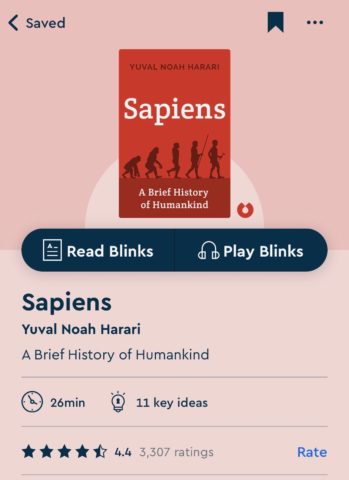Having launched way back in 2012, Blinkist kicked off a new breed of educational app that condenses or summarizes the contents of non-fiction books. Why spend hours reading entire tomes when you can absorb the key messages in a fraction of the time?
Several major apps have sprung up to fulfil a similar brief over years, albeit in subtly different ways. Lucid and Uptime are two of the most prominent.
So how do these three apps compare? Let’s take a closer look.
Blinkist
by Blinks Labs
Price: $12.99/£9.99 per month
Free trial: 7 day
As the original summarizing app, it’s only fair that Blinkist serve as the yardstick by which we’ll be measuring the other two apps. The whole Blinkist concept is revealed in one brief line at the outset: “Understand powerful ideas in 15 mins”.
It condenses and arranges books into key ‘Blinks’, or heavily simplified snippets of text that capture the gist of a main point. Yuval Noah Harari’s Sapiens (which we looked at in each of these apps) is broken down into 11 of these Blinks, for example. Besides text form, you can also have these Blinks read out to you, which is a nice touch that only one of the other apps adopts.
Despite its obvious quality and an impeccably laid out UI, it’s worth noting that Blinkist’s summaries offer far lengthier stretches of text than the two rival apps, so require a little more effort to parse.
Interestingly, Blinkist’s monthly subscription is now the cheapest of the three services, and it offers a seven day free trial. It also comes with a bonus account that can be shared freely with a friend or family member.
Blinkist
Lucid
by Polywise, Inc.
Price: $15.99/£11.99 per month
Free trial: 7 day
Lucid launched much later than Blinkist, in 2019. It’s made up ground quickly, with a particular focus on helping you to retain the information you’re learning.
It does this through book summaries that are highly visualised, with lots of bespoke animations. It also offers end-of-chapter summaries that task you with selecting a key word or phrase to further enforce your memory of what is being read.
Lucid has a much more elaborate set-up process that either of the other two apps, with a much longer personalization phase. This already overly long section is extended further by what amount to several adverts and testimonies to the app’s brilliance, which are annoyingly superfluous. It’s the only app of the three without an easy Apple sign-up option too.
Another annoying oversight is the lack of a search function, so you have to follow the app’s rigid ‘Paths’ to enlightenments – essentially bespoke courses that will lead you to ‘understand finance and investing’, ‘heal trauma and grow resilience’, and the like.
Lucid
Uptime
by UPTIME APP LIMITED
Price: $19.99/£14.99 per month
Free trial: 3 day
Launching in 2020, Uptime is the youngest of this trio. It also offers the snappiest summaries of all three thanks to its 5-minute ‘Hacks’. Open a new book in this app and it will commence an automatic run-through with super-condensed one or two-line summaries, as well as quotes and images. The effect is somewhat like an Instagram story or a digital slideshow.
Uptime breaks books down into three key insights, which you can skip to at any time, while it also offers the option to ‘Spark This’ – essentially an internal screenshot system that saves individual Hacks to boards. It’s a neat tool for revising students.
Like Blinkist, Uptime also offers audio playback if you wish to listen to its book summaries. Its scope is also wider than just books, offering summaries of courses, documentaries, and podcasts too.
The downsides with Uptime include the fact that its monthly subscription is the most expensive of the three, and that it only offers a three day trial for you to try before you buy.
Uptime
Summary
All three of these apps have a lot to offer anyone looking to shortcut or enhance their understanding of a book, but they’re far from identical.
Blinkist remains the most approachable of the three, with its simple set-up, lower price, week-long free trial, and extensive audio support. Its summaries are more in depth and less snappy than the others.
Lucid’s summaries are the best for visual thinkers, as it goes heaviest on animations and various interactive tools. However, its uniquely holistic structure is more intended for general mastery of a subject rather than finding and understanding specific texts.
Uptime, meanwhile, offers the quickest route to getting the gist of a book, with the pithiest summaries of all three. You’ll need to pay a little more for the privilege though, and it can feel more like you’re watching a presentation than actively reading a book.




